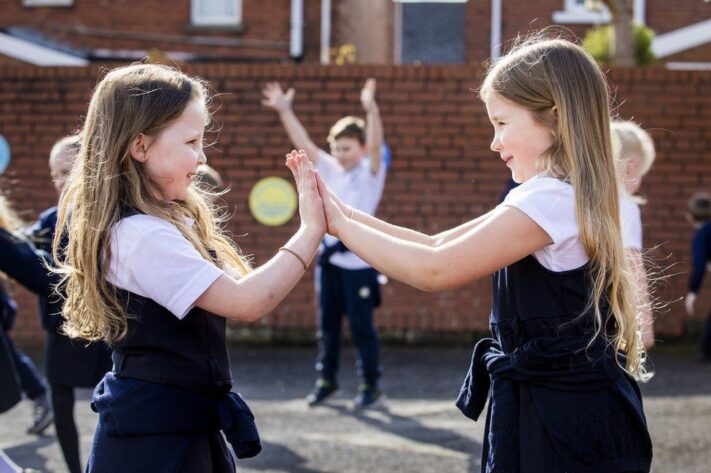 PUPILS in pre-schools, nurseries and primary one to primary three in the North of Ireland who were due to revert to remote learning from 22 March will be allowed to remain in class, the executive has agreed.
PUPILS in pre-schools, nurseries and primary one to primary three in the North of Ireland who were due to revert to remote learning from 22 March will be allowed to remain in class, the executive has agreed.
Ministers backed a proposal from Education Minister Peter Weir to scrap the original plan.
That date will see post-primary pupils in years 12 to 14 return to classrooms.
However, no decision has been taken yet on when all other pupils should to return to school.
First Minister Arlene Foster said the full return of pupils to schools would be discussed at the executive’s first formal review of the regulations on Tuesday 16 March.
“I would have liked to have moved further in relation to other cohorts but the Covid taskforce is looking at this in a strategic way and we’ll make announcements next week,” she told a news conference.
Education Minister Peter Weir had proposed that students in primaries four to seven should return on March 22, with all other post-primary students returning after the Easter break on April 12, subject to health advice.
Deputy First Minister Minister Michelle O’Neill said she recognised schools, students and parents needed “notice” and that she hoped the executive could provide school return dates on Tuesday.
“We have made progress today and we did say this would be a staged and phased approach,” she added.
Both ministers said their priority was ensuring the return of all pupils to schools as quickly as possible.
It is understood the executive was advised by health officials that the decision to “prioritise and accelerate face-to-face learning must be supported by the retention of other existing restrictions at least until after the Easter holidays”.
On Thursday nine more Covid-19-related deaths and another 223 cases of the virus were recorded in Northern Ireland.
Ms O’Neill said that the more transmissible Kent variant of coronavirus is now thought to account for about 80% of all cases in Northern Ireland.
“Where people are having more contact the epidemic will grow faster than it has done previously, and this is something we all need to be cognisant of as we gradually ease out of restrictions,” she added.
The transmission rate of the virus – or R-number – for the community in Northern Ireland is “consistently below one”, said the first minister.
She said she hoped that the drop in figures meant that the executive would be able to make more announcements next week about easing some restrictions.
Ms O’Neill said there would be “no major shifts” before Easter but that the executive wanted to allow people time to plan for the coming weeks and months.
Mrs Foster also said she recognised that people were facing into a second year with many being unable to spend Mother’s Day with their loved ones.
“Many of us will be relying on cards and phone calls to carry out our love and appreciation,” she said.
She also urged anyone wanting to celebrate Mother’s Day or St Patrick’s Day to do so with their own household.
Ms O’Neill said Northern Ireland was “on the cusp of brighter days” but warned that going to parties or gathering in groups posed a “serious risk to a fragile situation”.
Meanwhile, Stormont ministers have also agreed to additional funding to support businesses and jobs during the pandemic.
Finance Minister Conor Murphy had proposed extending rates relief for another 12 months for almost 30,000 businesses, in a package worth £230m.
His plan means that for the second year running businesses in the following sectors will not pay any rates:
childcare
hospitality, tourism and leisure
manufacturing
newspaper production
retail excluding larger food stores and off-licences
There will also be further business grants for some larger businesses and those who have not been eligible for other support.
Tags:




